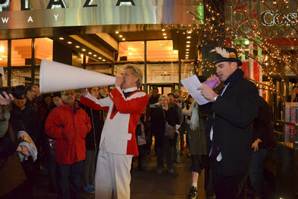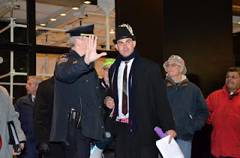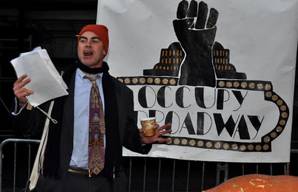"New York Fun Exchange”
Reflections on a Ludic Occupation!
Part 3
continued from page 2
By Benjamin Shepard
Occupy Broadway
In mid-October, we held a book reading for our book The Beach Beneath the Streets: Contesting New York’s Public Spaces. The book laid out some of the questions the movement would face about occupying public spaces. During the reading, a man stood up to declare that we should occupy one of the plazas on Broadway for a theater festival. The idea stuck. Yet instead of an afternoon performance, Occupy Broadway would be a 24- hour theater festival.
Occupy Broadway would take place on December 2. “We’re a big artistic mass; this is the next stage of the movement,” a young activist explained at a pre- action meeting on Tuesday night. Claire facilitated the meeting, filled with some of my greatest heroes in the world of cultural activism : theater types, writers, activists, and what seemed like the whole direct action or “DA” committee from Occupy Wall Street. Our agenda included discussion of stage management slots, dealing with the NYPD, our scenario/ flow, working group representation, scheduling, and a budget for the action, which was to take place in less than three days.
“This is great outreach to show we’re just disorganized rabble rousers,” one woman noted.
“No, we’re organized rabble rousers,” another concurred with a laugh.
The DA planned to organize the march le d by Rude Mechanical Orchestra to the undisclosed bonus plaza. We had another four bonus plazas established as alternate locations if we were unable to get into the first. Part of the point of the action was to actually make use these barren, or often barre n spaces. Developers pushed to repel users even as the managers of these plazas, such as Brookfield Properties, made huge profits while failing to pay taxes. Our job was to put these plazas to the use for which they were originally designed, for the people.
Rumors about the action had invited police to put in a few calls. We assumed they would be looking for any reason they could find to shut the action down. “We will perform, no matter what,” one young man chimed in during the discussion of the police.
Discussion eventually moved to the topic of the action itself, who would MC, and how we would fill the time if a performer was late. I would MC after the RMO stopped performing. Passing the “mic,” so to speak, to Rev. Billy and Penny Arcade.
Others contemplated our costume choices.
“Do we need bowties?” one of the DA crew asked, chiming in about the discussion of costumes for stage managers, actors, and the DA.
“Is it really a question of need?” a friend from Circus Amok chimed in as the topic turned to clothing choices: Hats or elf costumes for the stage managers? Claire displayed one of the elf costumes we’d worn in the shrub block. Other stage managers did not want to dress as elves for 24 hours. This discussion went on for a while, overlapping with discussion of Broadway- related songs we could sing, such as “One” from a Chorus Line and “Broadway Lullaby.” Eventually the DA decided on top hats, while stage managers went with flapper outfits. And the topic meandered back to the police.
“We have the power,” noted one of the first organizers. “And we are right. We have a right to do this. Police love us when we are afraid. No need to worry about cops. The worst case scenario is going to be fine.”
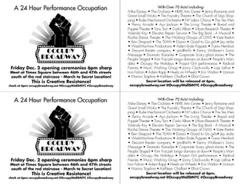
By Friday, some eleven hundred people had reviewed the press release for the action, with papers including the LA Times writing previews for the action. Journalists were calling from across the country. And it felt like for just a mom ment that Times Square really was a place where stories happened. My first interview of the day was with fashion art icons Andrew and Andrew on East Village Radio at 10:45 a.m., on Friday. By the end of the day, I had either completed or arranged for interviews with the New York Times, New York Magazine, Huffington Post, and KPFK in Los Angeles. Adrenaline was running out of my ears by lunch time.
My big decision before leaving Brooklyn to meet everyone at 43rd and 8th was how many costume changes. Monica suggested I have at least two, including a light lycra number as well as my Muppet outfit. So I packed three, forgot my water, and jumped on the bike for my second ride across the Manhattan Bridge of the day. The reflection of the sun was still shimmering on the water as it began to set while I crossed from Brooklyn into Chinatown.
Riding up through mid-town, one can really see how close people can be to becoming the Michael Douglas character in “Falling Down.” There are crazy amounts of traffic, jay walkers, and very little order to the street.
Arriving at the 15th floor of the meeting spot on 43rd and 8th, the DA all have their top hats; the stage managers look super duper in their flapper outfits. The food people are at the space, ready to bring food.
We walk out at 5:55 p.m. to meet everyone at Duffy Square, where RMO would lead everyone to the undisclosed location for the action. By 6 p.m., tweets across the city would announce the 50th and Broadway destination, where we marched. The band was boisterous, with everyone cheering along. Broadway leads us straight up to the Paramount Plaza. “They say cut back, we say fight back!!!!” people scream. “Occupy, shut it down, New York City’s a People’s Town!!!” The RMO concludes with their “Bailout Polka!!!” everyone dancing and jamming.
It's my moment. Fuck. The adrenaline which has been pouring out of my ears all day is slowing. I rehearsed my shortened version of the POPS manifesto all day. Now is the moment, as I begin what feels like the longest mic check in the history of a movement with many, many of these moments.
Mic Check, Mic Check, Mic Check
Welcome Police, Occupiers, and fellow New Yorkers.
You are all part of the show.
In recent weeks,
Bloomberg has tried to convince the world
that the Occupation show is over.
Yet, he’s a bad stage manager.
Today, instead of sitting on the sidelines,
Regular people around the world
Are tearing up the seats
And rushing the stage
No one can tell the difference
Between spectators and participants.
We are all the show.
You
Me
Us
Now
You
Me
Us
Now
The crowd was screaming. I should have stopped right there. This was getting long. But I went on.
Why have we decided
to perform in a privately owned public space
Because bonus plazas are
required to be open to the people.
Landlords make immense profits
even as they consistently
renege on their contract
with the city
by restricting public access.
All too many citizens
remain unaware
that they have a legal right
to access these spaces.
These are public spaces
being consumed by privatization.
Today and forever
we will hold developers to their legal obligation
to provide accessible publicly owned private spaces .
We call for an end
to the trampling
of public assembly
As Norman Siegel says,
"Last time I read the First Amendment
it didn't say,
'You have a First Amendment right
to peacefully protest on public streets,
except where Mayor Bloomberg lives.'”
Today we perform
in solidarity with occupiers from Tahrir Square to Davis, California
by challenging restrictions
on the public commons
and democracy itself.
Our occupation is a form of creative resistance.
We are using public space
to create a more colorful image
of what our streets could look like,
with public performances, art, and music
Through this open access performance,
New York re-imagines itself - as a work of art,
rather than a retail shopping mall.
With capitalism gone mad,
foreclosures increasing,
and bank crises consuming whole communities,
we are signaling through the flames
that there is another way of living.
Occupy public space.
Reclaim democracy.
Enjoy the show.
We are all the show.
You
Me
Us
Now
|
Will this mic check ever end? Talen, Shepard and company. by Erik McGregor |
The second half took forever. And I edited the Artaud line out about signaling through the flames, sadly. Thankfully it finally ended.
“Too long,” a fellow organizer noted.
“Let the words pour off your lips,” another noted. “Take your time.” Oy vey. “Boy,when you die at the palace, you really DIE at the palace!” Mel Brooks groaned in The History of the World. I knew what he meant. But the show had to go on. I had another two and half hours to MC. And my voice was gone. Sing through your diaphragm Ben, I remembered so many other actors advising me through the years. Still, my first instinct is to scream like a banshee through my throat until no sound comes out (which is sometimes a good thing).
Thankfully, Reverend Billy was there to speak. He would guarantee to take 45 minutes and put us back on schedule. The second he started to speak, he took me back to those days back in 1999 when I first met him preaching up here in Times Square. Talen recalled the musicians and sidewalk preachers, those men who thought they were Hendrix, the preachers preaching to no one in particular at all. When the city swept them off the sidewalks and back into the psychiatric hospitals, replacing Samue l Delany’s old movie houses with Disney stores and retail outlets, much of the energy of the street was gone, lost in a sea of identical details, as the preacher put it in perhaps the first sermon I heard from him that fall twelve years ago. He’d started preaching in the space only a few years prior. Nineteen-ninety-four, the last year before the Giuliani Law, was the last year that truly relevant theatre found its expression there. That year, Twilight, Angels in America, Bring on the Noise, and Bring on the Funk were performed there; those were plays which captured the conscience of the King and the culture. After the streets were sanitized in 1995, low culture was washed away from the streets of the Square; few stories found a foundation on the streets of the theater district; the high was no longer found inside the theaters of Broadway, such as the Winter Garden, where Mamma Mia was playing across from our stage. Without the low in culture, it is very difficult to find room for high. Without this contrast, we are left with the bland, the coo coo clock, as Orson Wells joked in The Third Man. “In Italy for 30 years under the Borgias they had warfare, terror, murder, and bloodshed, but they produced Michelangelo, Leonardo da Vinci, and the Renaissance. In Switzerland they had brotherly love - they had 500 years of democracy and peace, and what did that produce? The cuckoo clock.” Zoning happened because people did not like the aesthetics of Times Square and the cross- class contact this space engendered. In pushing for this, New York cut off a spigot to creativity which had run since the earliest days of the bawdy, godless Dutch colony. “I was preaching against sweatshops in front of the Disney Store and I saw Times Square privatized and turned into a giant shopping mall,” Talen preached. Not enough stories could hatch from the Times Square shopping mall. There wasn’t enough alchemy. In the years following 1999, we would go back for retail interventions at Starbucks, and Talen would get arrested at the Disney Store from time to time. Still, it felt like Times Square had been colonized by Disney and her tentacles were reaching out to the city as a whole. “Disney runs everything here,” David Letterman moaned in 1994, complaining about the corporate welfare deal which brought the corporation to the city.
Talen was on fire. Problem was, he was remarkably short, just ten minutes as opposed to the twenty he was allotted, and we were ahead of schedule. As Talen finished by 6:45, we moved to the front of the plaza, where the Labor Chorus performed, not a one of them younger than Peter Yarrow.
|
Even the police were part of the show. Photo by Erik McGregor |
As they performed “Solidarity Forever,” the police pushed to gain egress to the building. It's cool, a few of us noted, not wanting to fight the police. That was not the point. We still had the plaza. “Out with the jive, in with the love,” I mic checked. I would MC for the next two hours. By 7:15, we had cleared our first five acts, and we were a half hour ahead of schedule, where we would stay, scrambling to find story tellers, singer songwriters, theater geeks, hula hoopers, and professors from the crowd to help us hold the space. In between performers, I changed into my second and third costumes . Some performers held the space better than others. Looking at the crowd, a fear of god feeling set in. We had twenty two hours and forty-five minutes to go and people were already pooping out. “We’re going to lose the crowd,” I groaned. Let's set an intermission, I said to Monica, who was well aware we could lose the crowd if we broke for dinner. I wasn’t sure we could hold the space as one performer chimed in after another, some late, and some thankfully early. Hunken jumped in and le d everyone in “The Consensus Dance,” to the tune of the Hokey Pokey. And eventually Penny Arcade showed up, holding the space for some twenty minutes.
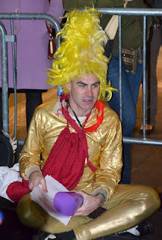 |
Fear of God. We have another 22 hours and 45 minutes to go and we are an hour ahead of schedule. |
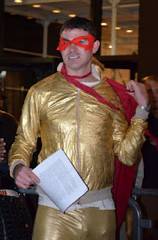
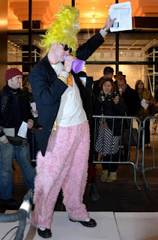 |
Costume changes two and three. The show must go on! |
“When does Mike Daisey come on?” the writer from the New Yorker asked. “Why is he starting so late?”
By 8:30, more and more regular people were jumping on the stage to talk and it felt like we could make it. My co-author Greg’s wife Molly rocked on the hula hoops and Greg told a story about the owners of the plaza.
And we had the crowd back.
By the time Jenny Romaine from Great Small Works arrived, she owned the place. And so would Reno following her. One great performance after another until well into the morning hours, some telling jokes, others singing or doing tricks. We all really were the show.
Mike Daisey stood up around midnight. “On the subway up to the show,” Daisey mused he had no idea of how many people he would be performing for. He confessed he had no idea what he was getting into. “And I’m delighted you’re here,” he explained, with a humble gentleness, as the crowd cheered. He immediately established a rapport with the crowd. To hold a space really is about connecting with the crowd and hearing what they need, what are their concerns, etc. “It's an amazing thing to try to hold a space. Cause that’s what we do in the theater, we hold spaces. But one of the tricks they never tell you is, to not hold it at all, but to give it back to the people, to give it back to the audience. They are the source, the thought, the source. You don’t do anything. You take what you are given, you mediate that and give it back to them.” His monologue really was a highpoint. In a way, he was talking about what Talen was talking about, the links between audience and self, community and city, the collective experience of stories, dreams, unconscious desires, reflections on the tragicomic continuum of human experience, all of which is necessary to truly say we are living democratically. It was that contract of experience which produced Kushner in Times Square out of the AIDS crisis. This close contact, expression, dialogue, community sharing and debating is part of what used to propel the stories of Times Square. And it could be in the future. “Call me if you want to do something else like this,” he told me after his performance.
As I left Friday night, a group was performing Ben Johnson. The 3-5 a.m. shift for the people’s stage open mic turned out to be a huge success.
As I taught that morning at CUNY, the Hungry March Band performed, turning the plaza into a dance floor. And the General Assembly declared the Plaza, “the People’s Performance Plaza.” Many on hand would call for more shows in similar plazas.
By the time I arrived the next day after lunch, the show was still chiming along. Monica and Ben looked a little tired, but they seemed to be running on a second wind.
“Every time we would sit down, the police would come up to us and make sure we were not sleeping.”
Ben Cerf, one of the co-organizers of the event, mused that Occupy Broadway demonstrated that it was possible for OWS to thrive even after being evicted from the park. “This is really an experiment on the mobility of the movement,” he continued. “We have brought all the working groups here. We had sustainability, we had the kitchen, the Lawyer’s Guild, the medics – we had everything a civilization needs, really…. So we show that we can mobilize this kind of thing in an instant, in a day and we can respond to any necessity. Here the need was to make theater. Tomorrow, it will be to defend against a foreclosure, or any other thing you can imagine.”
With two hours to go, Andy Vélez stood smiling, recognizing we were really going to do it. He’d battled Bloomberg before. And he was more than happy to see a counter narrative to Bloomberg’s New York by and for the 1% take shape. My friend Peter filmed Vélez talking. Vélez explained that when he met a representative from the City after he’d helped organize a zap at the Mayor’s house, he was taken by how uptight the man seemed to be. “Don’t’ worry, I am only attracted to heterosexuals,” Vélez declared attempting to put the man at ease. From Occupy Broadway to ACT UP, Vélez has made a career for standing up for what is right in this world, through direct action, play, and a little fun.
|
Reading the First Amendment at 2 p.m. Saturday. We'd read it over and over each and every hour for 24 hours. |
The next few hours of the final stretch were some of the most fun moments of the event.
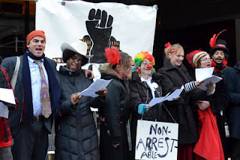
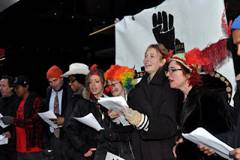
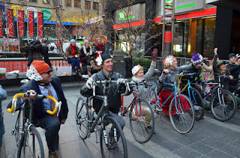
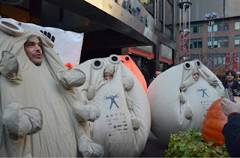 |
Singing, performing, and catching a second wind. |
By this point, Monica had found yet another wind, helping lead the crowd in reciting the First Amendment, inviting us all to join in some Occupation anti-consumer carols, which were later interrupted by the Yes Men, and later in a dance on bikes routine with her dance troop Heelz on Wheels. Occupy Broadway was like a dream. I have never done something like that. It was lovely to watch the action take shape as a public performance, which generated story after story about democracy, public space, and the ever expanding movement. After it was over, Hunken would reflect on the action.
Thank you everyone for making this happen. Occupy Broadway was another example that occupation is creation. And when police and government push us out of public spaces they are not only attacking a creative act of the people, they are attacking our democracy. The more we make clear our intentions, this "building" of something together, the symbol itself becomes indestructible. There is an unspoken protection of the ritual of performance. You must let the show continue. We will continue to create together in our commons. The Show Must Go On!
